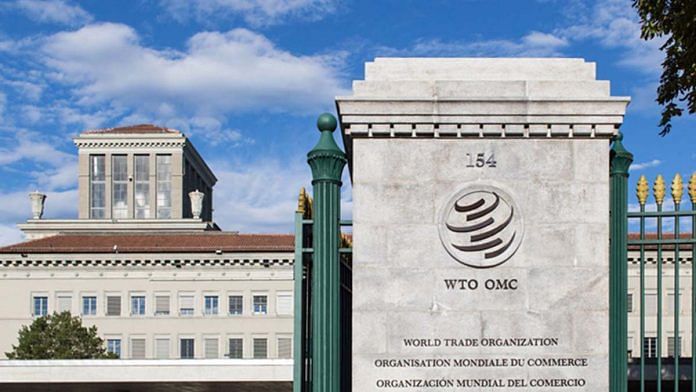
New Delhi: The US, China and the European Union (EU) have come down heavily on India for its “rising trade barriers and restrictive investment policies” at the Geneva-based World Trade Organization (WTO).
India’s top three import sources for the 2019-20 fiscal raised the issues at the WTO’s India trade policy review (TPR), according to a Geneva-based trade official.
The TPR, which began Wednesday, will conclude Friday. It is being carried out under the aegis of WTO’s General Council, its highest decision-making body. The TPR is an important mechanism under the WTO’s monitoring function and involves a comprehensive peer-review of a member country’s trade and economic policies.
According to the official, the US has said that since India’s last TPR, which took place in 2015, New Delhi has increased the country’s average ‘Most Favoured Nation’ (MFN) tariff rate to 17.6 per cent in 2019 from 13.5 per cent in 2015.
MFN tariffs are what countries promise to impose on imports from other members of the WTO, unless the country is part of a preferential trade agreement. In other words, MFN rates are the highest rates that WTO members charge one another.
This issue was also highlighted recently by the outgoing US Ambassador to India Kenneth Juster, who said “frustrations and frictions” have mired two-way trade between India and the US.
“As US and other companies find it increasingly difficult to operate in China or seek to diversify away from Chinese-led supply chains, India has a strategic opportunity to become an alternative destination for manufacturing investments in the Indo-Pacific region. But to fully seize this opportunity, the Indian government may well need to take further action,” Juster said.
However, Commerce Secretary Anup Wadhawan, who is heading India’s delegation for the TPR, stated that in the last five years since the last TPR, the government has taken effective steps to “reform and transform” the entire economic ecosystem, according to a press statement by the Ministry of Commerce and Industry.
Also read: Don’t get caught up in MSP battle. India must move to end inequality in WTO laws
Slew of concerns
During the first day of the review at the WTO, the US also said if India continues to raise its tariff structure, it will “not facilitate India’s further integration into global supply chains”, according to the official quoted above.
India has been making efforts to be part of the global supply chain even as it positions itself as an alternative to China for global companies in a post-Covid world.
The US has also urged India to allow foreign participation in its domestic services sector, such as retail, e-commerce and insurance, thereby “removing unjustified product standards and reconsider agricultural support programmes which disrupt domestic and world market prices”, the official said.
Meanwhile, China, India’s biggest source of imports in 2019-20, expressed its “deep concern” over recent foreign direct investment policies which curb takeovers and acquisitions of Indian companies, the official said.
China also noted the “high number and prolonged application of trade remedy measures by India, which it warns could disrupt normal trade”.
In April 2020, the Narendra Modi government took steps to restrict Chinese investment coming into India.
The European Union expressed concerns over “the continued trend of new barriers to trade cropping up in India, which have been amplified in the wake of the Covid-19 crisis”, according to the official.
The EU specifically mentioned high customs duties, unpredictable trade procedures, cumbersome product standards, gaps in intellectual property rights protection, and narrowing access to government procurement as some of the major concerns.
Also read: India’s ban on apps not beneficial to either country & violates WTO rules, says China

Sab mile hue hain, ji … 2. FS Shyam Saran concludes a recent column in BS with : The new year finds India on the very margins of an Asian economic space dominated by China. Atmanirbhar Bharat must deal with this inescapable reality. 3. One cannot judge what India Inc makes of this. At one level, protectionism suits them. Gives them a sheltered market. However, this moving away from globalisation is stunting the growth of the economy – poignantly reflected in the stunting of our children. For that matter, one also cannot assess whether the tycoons – barring a few – are in any position to meaningfully influence the formulation of economic policy. 4. The economic marginalisation Shri Saran refers to will inevitably lead to diplomatic marginalisation as well. Aap log English achhi bol lete hain is the only compliment our diplomats can hope to earn.